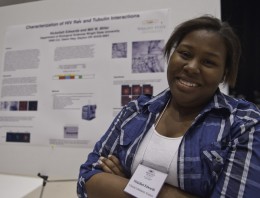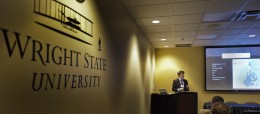
Undergraduate Nickellatt Edwards presented her research poster titled: Characterization of HIV Rev and Tubulin Interactions.
- Modeling the Liquid Phase Exfoliation of Graphene
- Music Instruction for Students Who Are Blind: A Collection of Methods and Materials for the Music Educator
- Supplier Decisions in a Two-Retailer, One-Supplier Transshipment System with Quantity Discounts
All were among the 134 academically diverse poster and oral presentations presented Friday, April 13, during the Celebration of Research, Scholarship and Creative Activities.
Rich and robust, Wright State University’s student research efforts were on display for the third annual Celebration in the Student Union.
The event is designed to showcase the work Wright State University students are doing both on the undergraduate and graduate levels, whether it be in STEM (Science, Technology, Engineering and Mathematics) disciplines or in the liberal arts.
“I think the stigma is that there’s only research being done in the sciences, but that’s not true. It’s done in liberal arts too,” said Dominique Belanger, director of undergraduate research and STEM activities. “It’s done in education, it’s done in theater and music. It’s everywhere. It just takes on a different form.”
According to Belanger, interest from students in the event continues to increase with participation up in comparison to last year.
“I think word is getting out and students are realizing this is something they ought to be doing,” said Belanger.
The forms of research presented at the event ran the gamut and were shepherded by students from diverse backgrounds as well.
Poster presenters Leigh Deuter and Mike Taylor, two non-traditional students working on bachelor’s degrees at the Lake Campus, presented their earth and environmental sciences research from work they’ve been doing while collecting and analyzing prehistoric shark fossils.
The Chondrichthyan species lived over 340 million years ago in the Mississippi system of northern Alabama. Much of the best research was done by a Southern scientist whose work was largely destroyed by Union troops during the Civil War. Deuter and Taylor have been unearthing new specimens to rebuild the work.
“We’ve been working in the muddy backwaters type of area from that time,” said Taylor. “We’re just stirring it up a little bit to see what we can find.”
As they’ve excavated, split and cleaned fossil-laden rock from the region, Deuter says they’ve found many teeth specimens of the species.
“With a trained eye you start to be able to determine what’s a pebble and what’s a tooth,” said Deuter.
Deuter and Taylor see the celebration event as a prime time to dig up some new ideas for their work too.
“As fellow students, we can co-mingle and network and look at each other’s posters,” said Deuter. “I saw there’s a filtration poster I want to talk to the student about to see if it would have applications in our laboratory.”

Wright State student Spencer Brannon was one of more than 60 students who chose to give an oral presentation instead of a poster presentation.
Students like Rebekkah Mulholland chose to conduct oral presentations instead of posters like Deuter and Taylor. She and six other students recently returned from the The Faith & Politics Institute’s 12th Congressional Civil Rights Pilgrimage.
Seven undergraduate and graduate students visited historic civil rights sites in Alabama. They also visited with present-day congressmen and civil rights leaders to learn more about contemporary civil rights issues.
“It wasn’t just visiting these sites to look at the historical approach but how they’re very relevant today with contemporary issues such as voter ID, registration rights and immigrants laws in Alabama,” said Mulholland.
One of the unique attendees of this year’s event was a graduate from last year, Jeff Fogle.
A research and development chemist for Heraeus Precious Metals North America DayChem (Heraeus), Fogle presented some of his chemistry research in polymers last year and picked up a job interview in the process.
“I think it’s a good way to get your research out there to other students, but also to other companies who might find it interesting and who might offer you a job,” said Fogle.
Just one year later, Fogle was part of a gaggle of sponsor companies, including Peerless and Sterling Production Control Units (PCU), that supported the event financially and consider it an opportunity to meet talented students they may want to offer jobs.

 Wright State baseball to take on Dayton Flyers at Day Air Ballpark April 15
Wright State baseball to take on Dayton Flyers at Day Air Ballpark April 15  Wright State joins selective U.S. Space Command Academic Engagement Enterprise
Wright State joins selective U.S. Space Command Academic Engagement Enterprise  Glowing grad
Glowing grad  Wright State’s Homecoming Week features block party-inspired events Feb. 4–7 on the Dayton Campus
Wright State’s Homecoming Week features block party-inspired events Feb. 4–7 on the Dayton Campus  Wright State music professor honored with Ohio’s top music education service award
Wright State music professor honored with Ohio’s top music education service award 